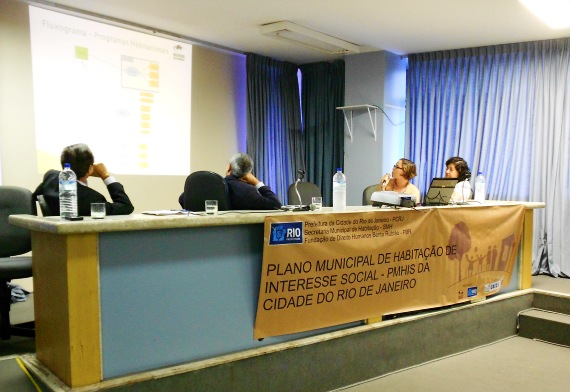From November 28th to the 30th there was a series of presentations and meetings held at headquarters of CREA-RJ in the center of Rio de Janeiro. The three day event was organized by The City of Rio de Janeiro, the Secretary for Housing of Rio de Janeiro and the NGO Fundação Bento Rubião (henceforth FBR). The point of the three day event was to address the Municipal Housing Plan, which FBR recently won the bidding to design and implement.
Many large NGOs in Rio, including the some of the most famous ones, have been mysteriously silent since the City began its mass eviction campaign in April of 2010.
Bento Rubião has gained its fair share of critics for partnering with the City. The majority of these critiques assert that it is the City that is actively trying to evict thousands of low income resident’s in Rio de Janeiro. Some believe that the City will succeed in co-opting FBR. The City has been accused of doing so with many other NGOs that receive their funding. For example, many large NGOs in Rio, including the some of the most famous ones, have been mysteriously silent since the City began its mass eviction campaign in April of 2010. Many believe this is because they are apprehensive of losing their funding, which is entirely possible, if they were to challenge the entity that pays their salaries and activities. This is why activists are concerned that FBR will follow the same path and be coerced into playing into the hands of the City’s conservative agenda.
While anything is possible, I don’t think this will happen. FBR has a history of being loyal to the communities and residents they work for. Also, they included a clause in their bidding proposal that clearly indicates the City may not attempt to interfere in their work or the contract will be dissolved. This doesn’t necessarily mean too much in a city like Rio where official decrees and laws are regularly broken, but it is something to consider. Also, as one longtime employee of FBR, who also lives and works in Rocinha, told Mundo Real, “if it was not FBR that won this bidding, it would have been another NGO and at least this way we are on the inside and will know most of what the City is planning in regards to evictions and housing.”
 The event was planned to establish guidelines and proposals for the creation of housing in the city of Rio de Janeiro. The objective was to discuss alternatives for the creation of housing in the social interest as well as new management models. Without a serious housing plan or policy – major problems will continue to occur in Rio. Laboriaux is a perfect example of what can happen when a city has no effective housing policy. Laboriaux was officially created by the City of Rio de Janeiro (and to a lesser degree by the state of Rio) in 1982 when 73 families were removed from the bottom of Rocinha and resettled in area of Laboriaux. These 73 families were provided housing alongside the also newly built road, Rua Maria do Carmo. Roughly 400 people lived in Laboriaux by the end of 1982. With no housing plan in place the city and state virtually forgot about Laboriaux. Obviously the population of Laboriaux increased and so did haphazard construction, but the authorities were not present to regulate this growth, they simply allowed the area to expand rapidly. By the early 2000s Laboriaux’s population was already over 3000 and growing and there were houses with three and in some cases four stories. Now the houses in Laboriaux could be seen from Lagoa and elsewhere in Rio’s affluent Zona Sul and this began to gravely concern some powerful people. The rains of April 2010 provided the perfect opportunity for the City and Rio’s power elite to push for the complete eviction of Laboriaux, with no plan in place as to where to send the evicted residents. This mess and countless others across the city could be largely avoided if there was a serious and fair housing policy in place.
The event was planned to establish guidelines and proposals for the creation of housing in the city of Rio de Janeiro. The objective was to discuss alternatives for the creation of housing in the social interest as well as new management models. Without a serious housing plan or policy – major problems will continue to occur in Rio. Laboriaux is a perfect example of what can happen when a city has no effective housing policy. Laboriaux was officially created by the City of Rio de Janeiro (and to a lesser degree by the state of Rio) in 1982 when 73 families were removed from the bottom of Rocinha and resettled in area of Laboriaux. These 73 families were provided housing alongside the also newly built road, Rua Maria do Carmo. Roughly 400 people lived in Laboriaux by the end of 1982. With no housing plan in place the city and state virtually forgot about Laboriaux. Obviously the population of Laboriaux increased and so did haphazard construction, but the authorities were not present to regulate this growth, they simply allowed the area to expand rapidly. By the early 2000s Laboriaux’s population was already over 3000 and growing and there were houses with three and in some cases four stories. Now the houses in Laboriaux could be seen from Lagoa and elsewhere in Rio’s affluent Zona Sul and this began to gravely concern some powerful people. The rains of April 2010 provided the perfect opportunity for the City and Rio’s power elite to push for the complete eviction of Laboriaux, with no plan in place as to where to send the evicted residents. This mess and countless others across the city could be largely avoided if there was a serious and fair housing policy in place.
These evictions across the city could be largely avoided if there was a serious and fair housing policy in place.
So far these meetings between the City and FBR have not had significant popular participation. This three day event was no different. If the popular participation does not increase then there will likely be problems ahead. So far these meetings have been largely dominated by technocrats and NGOs. This needs to change if a serious housing plan and policy is to be arrived at.


You must be logged in to post a comment.